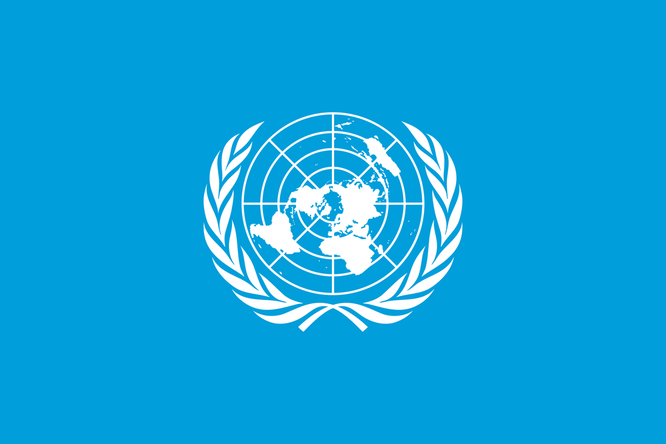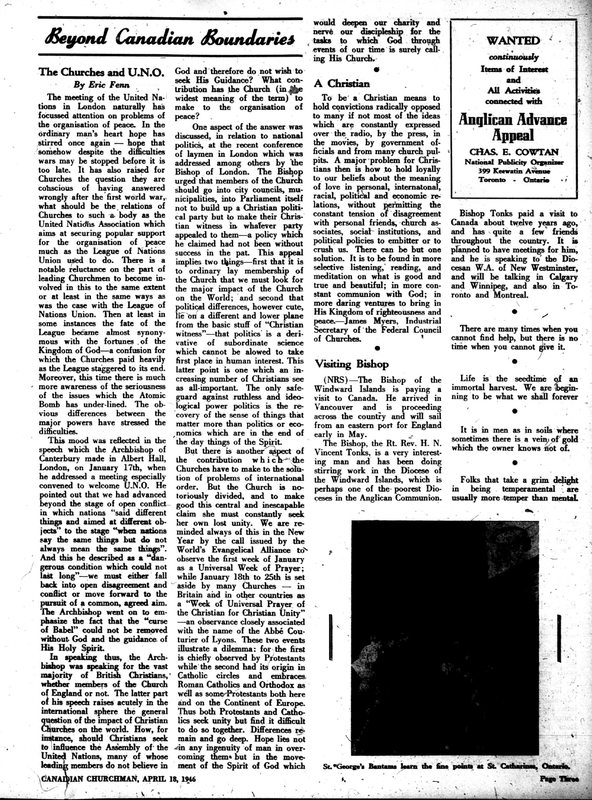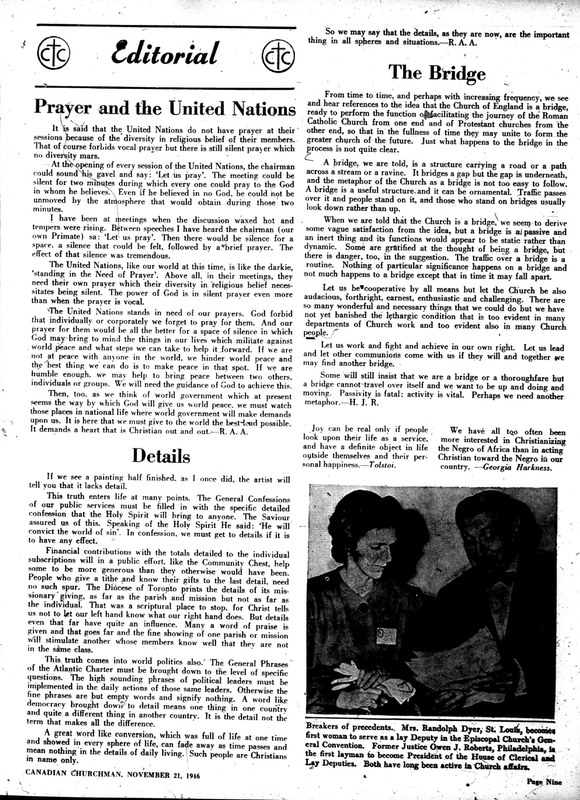|
My blog posts revolve around my interests and vocation as a historian: the intersection of history and contemporary church life, the intersection of history and contemporary politics, serendipitous discoveries in archives or on research trips, publications and research projects, upcoming conferences, and speaking engagements.
I sometimes blog for two other organizations, the Canadian Baptist Historical Society and the Centre for Post-Christendom Studies. The views expressed in these blogs represent the views of the authors, and not necessarily those of any organizations with which they are associated. |
|
https://commons.wikimedia.org/wiki/File:Flag_of_the_United_Nations.svg While the ideals of the United Nations (UN) are commendable, it seems obvious that the UN as an organization is deeply troubled and bordering on irrelevancy. Its system of governance is paralyzed, its decisions partisan, its leaders suspect, its resolutions flouted, and its ideals lost in the passions of political brinkmanship. Some call for its demise. Most ignore it. Yet what many people do not know is how the churches at one time were enthused with the UN and saw it as a way forward in a troubled world. Consider the case of Canadian churches. The churches in Canada were enthused with the formation of the League of Nations (1919) and were dismayed with its subsequent demise in the face of rising empires such as Germany and Japan. It did not survive the Second World War. However, out of the ashes of the Second World War arose a second iteration of an international organization that could promote justice, alleviate suffering, and arbitrate conflicts. The ideals were high, as were the expectations. For instance, American President Harry S. Truman declared “These [UN buildings] are the most important buildings in the world, for they are the center of man’s hope for peace and a better life…There are no international problems which men of good will cannot solve or adjust.”[1] While the churches would take issue with his hyperbolic claim that the UN was the “center of man’s hope” (they would have argued that the gospel was), they certainly supported the hopes expressed behind such lofty rhetoric. As one leader wrote: "Of course, the United Nations Charter is only a beginning in the supreme task of creating a new world civilization based upon law and free cooperation. But the great hopeful fact remains that a beginning has been made, and that the new organization of United Nations has already begun to function with reassuring evidence of efficiency and success. We hail this United Nations organization as the first star of hope to appear in the black sky of a prostrate and ruined world."[2] While there were some concerns expressed about the costs and effectiveness of the UN,[3] or the appropriateness of previous views of the League of Nations that made the League “almost synonymous with the fortunes of the Kingdom of God,”[4] the commentary on the UN was ubiquitously positive.[5] Formal resolutions were made by denominations in support of the UN.[6] Calls for prayer were made for the UN.[7] Education on the UN was provided.[8] At the heart of the broad support for the UN was the recognition that the churches and the UN shared a common purpose of pursuing justice and peace on the earth.[9] That was then and this is now. After the Cold War, countless hot wars, simmering tensions, widespread atrocities and genocides, ongoing dictatorships, proxy wars, terrorism, weapons of mass destruction, and so on, the UN has devolved to a sad state. As any observer today can easily see, the UN has been in trouble for decades and remains so today. Yet based on the churches’ aspirations seventy years ago, the churches have a role to play in helping it be what it was meant to be. Those leaders of old were not Pollyanna – they knew the hard realities of international politics (after all, they had been through two world wars in a generation). In fact, it was because of those hard realities that the Christians needed to get involved in such matters. It is not a matter of trying to create a utopia (those dreams died in the two world wars), nor an effort to establish a one world government. It is also not to be an attempt to make it a distinctly Christian organization. It is simply a matter of influencing an organization that – despite its glaring limitations and faults – has the potential to do good. And that is something worth the churches’ informed and prophetic engagement and prayers. [1] Harry S. Truman, Address at the Laying of the Cornerstone of the United Nations Building, New York City, 24 October 1949. [2] Charles A. Eaton, “Peace Faces a Fateful World,” Canadian Baptist, 1 June 1946. [3] “Is It Worth It?” Canadian Baptist, 15 January 1949. [4] Eric Fenn, “The Churches and the U.N.O.,” Canadian Churchman, 18 April 1946. [5] For instance, see “World Government,” Canadian Churchman, 3 January 1946; R. A. A., “Towards Peace,” Canadian Churchman, 7 March 1946; R. A. A., “Concealment,” Canadian Churchman, 19 December 1946; Claris Edwin Silcox, “The United Nations – After Two Years,” Observer, 1 September 1947; Claris Edwin Silcox, “The United Nations and Human Rights,” Observer, 15 September 1947; “World Federation,” Observer, 15 November 1948; Clara Anderson,” Visit to the United Nations,” Observer, 15 February 1948. [6] “Be It Resolved,” Canadian Baptist, 15 July 1949. [7] “Prayer and U.N.O.,” Observer, 1 May 1946; “The Strength of Great Relationship,” Canadian Baptist, 15 July 1949; R. A. A., “Prayer and the United Nations,” Canadian Churchman, 21 November 1946. [8] Alice Johnson, “You and the United Nations,” Observer, 1 December 1947. [9] There was a recognition that both the Commonwealth and the UN had roles to play in solving the postwar crises. And, in both areas the church had “its part to play.” See “The Year Ahead,” Observer, 1 January 1948.
0 Comments
Leave a Reply. |
Archives
May 2024
|



 RSS Feed
RSS Feed
